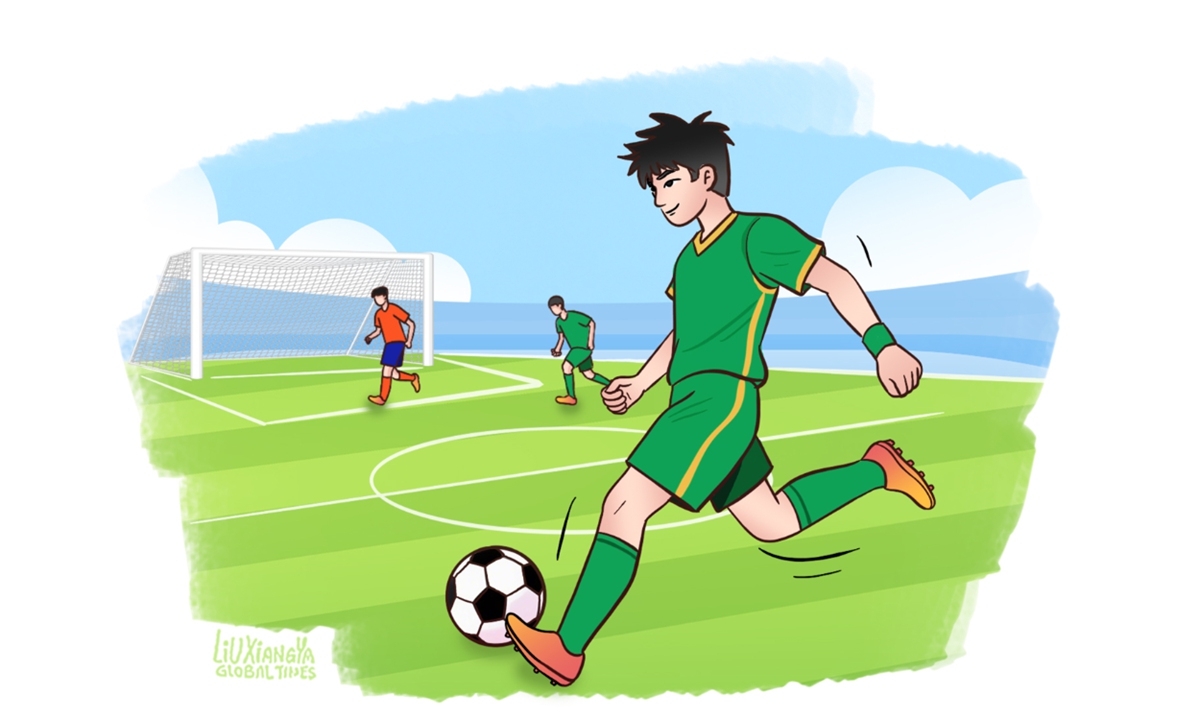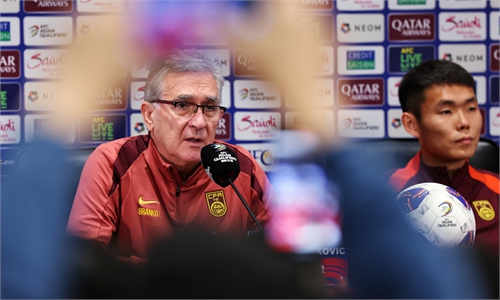ARTS / CULTURE & LEISURE
Wang Yudong’s rise signals new hope for Chinese football

Illustration: Liu Xiangya/GT
While his club Zhejiang FC suffered a 4-2 defeat to Shandong Taishan on Saturday, striker Wang Yudong earned credits for scoring twice in the game, which propelled him to the top of the scoring list in the Chinese Super League with eight goals across 11 appearances. Tying with Alberto Quiles of Tianjin Jinmen Tigers and Fábio Abreu of Beijing Guoan for first place, Wang's performance, with all his goals coming from open play, signals fresh hopes for Chinese strikers.For years, the CSL has been criticized for its over-reliance on foreign strikers, with domestic forwards often overshadowed and underutilized. Foreign players, brought in with hefty investments, have typically dominated the goal-scoring charts, leading to a perception that Chinese strikers lack the ability to compete at the top tier.
Wang's achievement shatters this narrative. His ability to consistently find the back of the net against strong defense proves that local players can indeed thrive in a league previously dominated by overseas talent. His goals showcase a level of technical proficiency and goal-scoring instinct that rivals, and in many cases surpasses, his foreign counterparts whose earnings can be as much as 3 million euros ($3.4 million) per year.
Wang's rise is not an isolated incident but a product of a carefully nurtured youth development system, particularly by his club Zhejiang FC. The club has long been committed to investing in its youth academy, focusing on cultivating homegrown talent through structured training programs. This commitment has now borne fruit, with Wang emerging as the poster boy for their efforts.
His success also shines a light on the broader progress of China's youth football development. Although the Chinese under-20 national team failed to qualify for the FIFA U-20 World Cup, several players from that squad have made significant strides in the CSL this season. Liu Chengyu of Shanghai Shenhua, another attacking talent from the U20 team, has scored in two consecutive CSL matches, while Kuai Jiwen of Shanghai Port has been creating scoring opportunities off the bench. These performances indicate that there is a growing pool of talented youngsters ready to make their mark at the senior level.
The case of Zhejiang FC highlights the importance of patience and sustained investment in youth academies. In the past, Chinese football has often been criticized for short-term thinking, prioritizing immediate success with foreign signings over building a sustainable youth system. Wang's story provides a blueprint for other clubs: by focusing on grassroots development and integrating them into the first team gradually, Chinese football can produce more homegrown stars who can carry the flag for the national team in the future.
The Chinese senior national team has in recent years faced a dilemma in the attacking department. For years, the forward line has relied heavily on veterans like 33-year-old Wu Lei and naturalized players, whose form has been inconsistent as they age. The likes of Wei Shihao and Zhang Yuning have shown promise at times but have failed to establish themselves as reliable goal-scorers on the international stage. This over-reliance on aging players and the lack of a viable youth replacement plan has been a major concern for the national team.
That makes Wang's emergence a much-needed solution. His performance in the CSL has demonstrated that he has the potential to step up to the international level. His speed, agility, and clinical finishing make him a different type of striker compared to the current national team options. Moreover, his presence in the national team will foster healthy competition. The current strikers will be pushed to maintain their form, while Wang will need to prove he deserves a place in the starting lineup.
Looking ahead to the upcoming World Cup qualifiers, during which China will face tough battles to secure six points in the matches against Indonesia and Bahrain in June, having a young and in-form striker like Wang could be crucial. His ability to adapt to different playing styles and handle the pressure of international competition will be tested, but his recent form suggests he has the mental and technical attributes to succeed. If he continues to develop, there is no reason why he cannot become a key figure in the national team.
One of the most exciting prospects arising from Wang's success is the possibility of him following in the footsteps of Wu and embarking on a career overseas. Wang's performance has not gone unnoticed by European scouts, and Zhejiang FC's Vice President Xue Jun has stated that the club supports the young striker in pursuing a move abroad if the "right" opportunity arises.
A successful move to Europe would not only benefit Wang individually, helping him develop further as a player, but also serve as an inspiration for other young Chinese players. It would demonstrate that there is a viable path from domestic leagues to European leagues, encouraging more clubs to invest in youth development and more players to aim for higher goals.
However, it is important to remember that sustained success requires continued hard work. It would be the best for Wang to remain grounded, continue to develop his game and handle the pressure of being labeled as the "new hope" before a genuine move happens. Clubs must also maintain their commitment to youth development, ensuring that Wang is not a one-off phenomenon but the first of many talented young players to emerge.
The author is a reporter with the Global Times. life@globaltimes.com.cn



